How to convert Bytes to Dictionary in Python
Last updated: Apr 10, 2024
Reading time·3 min

# Table of Contents
- Convert Bytes to Dictionary in Python
- Convert Bytes to Dictionary using json.loads()
- Replacing the single quotes with double quotes before using json.loads()
- Converting a Dictionary to Bytes
# Convert Bytes to Dictionary in Python
To convert a bytes object to a dictionary:
- Use the
bytes.decode()method to convert the bytes to a string. - Use the
ast.literal_eval()method to convert the string to a dictionary. - The
literal_eval()method safely evaluates a string that contains a Python literal.
from ast import literal_eval my_bytes = b"{'first': 'bobby', 'last': 'hadz'}" my_dict = literal_eval(my_bytes.decode('utf-8')) print(my_dict) # 👉️ {'first': 'bobby', 'last': 'hadz'} print(type(my_dict)) # 👉️ <class 'dict'>
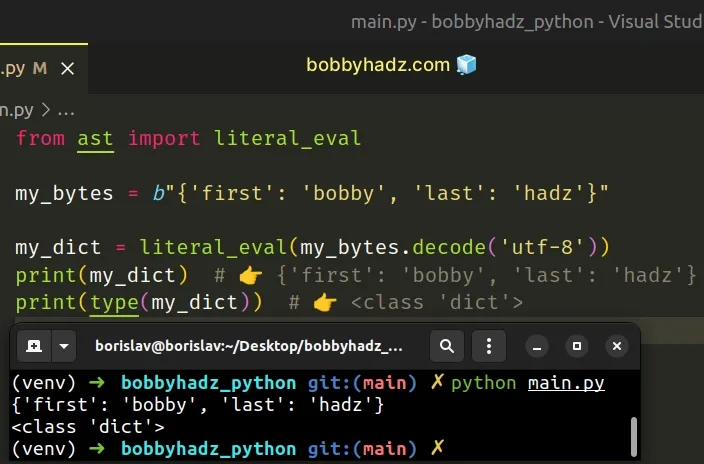
We used the bytes.decode() method to convert the bytes object to a string.
my_bytes = b"{'first': 'bobby', 'last': 'hadz'}" my_str = my_bytes.decode('utf-8') print(my_str) # 👉️ "{'first': 'bobby', 'last': 'hadz'}" print(type(my_str)) # 👉️ <class 'str'>
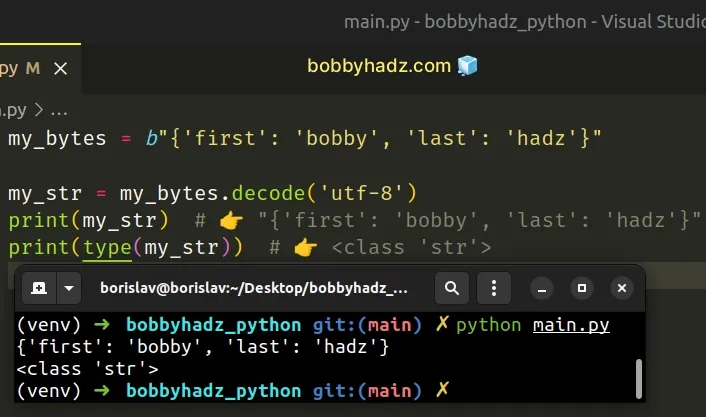
The bytes.decode() method returns a
string decoded from the given bytes. The default encoding is utf-8.
The last step is to pass the string to the ast.literal_eval() method.
The ast.literal_eval() method allows us to safely evaluate a string that contains a Python literal.
from ast import literal_eval my_bytes = b"{'first': 'bobby', 'last': 'hadz'}" my_dict = literal_eval(my_bytes.decode('utf-8')) print(my_dict) # 👉️ {'first': 'bobby', 'last': 'hadz'} print(type(my_dict)) # 👉️ <class 'dict'>
If the properties in your bytes object are wrapped in double quotes, you can
also use the json.loads() method.
# Convert Bytes to Dictionary using json.loads()
This is a two-step process:
- Use the
bytes.decode()method to convert the bytes to a string. - Use the
json.loads()method to parse the string into a dictionary.
import json my_bytes = b'{"first": "bobby", "last": "hadz"}' my_dict = json.loads(my_bytes.decode('utf-8')) print(my_dict) # 👉️ {'first': 'bobby', 'last': 'hadz'} print(type(my_dict)) # 👉️ <class 'dict'>
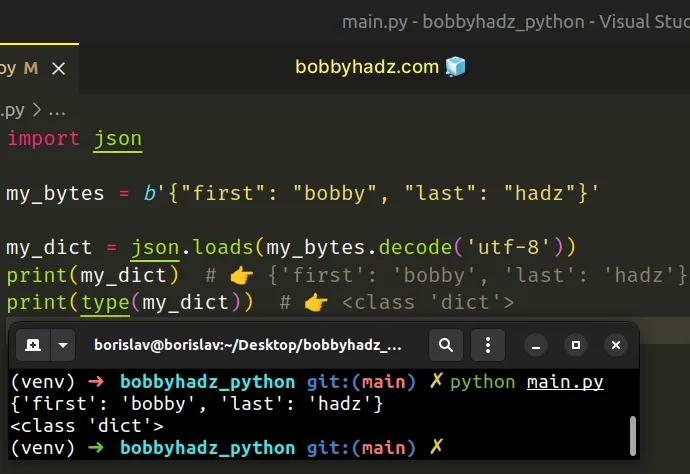
The json.loads() method parses a JSON string into a native Python object.
import json json_str = r'{"name": "bobbyhadz", "age": 30}' my_dict = json.loads(json_str) print(type(my_dict)) # 👉️ <class 'dict'>
However, the method only accepts valid JSON strings.
JSONDecodeError is raised.If the properties in your bytes object are not wrapped in double quotes, use the
ast.literal_eval() method.
# Replacing the single quotes with double quotes before using json.loads()
An alternative approach would be to replace the single quotes in the string with double quotes.
import json my_bytes = b"{'first': 'bobby', 'last': 'hadz'}" my_str = my_bytes.decode('utf-8').replace("'", '"') print(my_str) my_dict = json.loads(my_str) print(my_dict) # 👉️ {'first': 'bobby', 'last': 'hadz'} print(type(my_dict)) # 👉️ <class 'dict'>
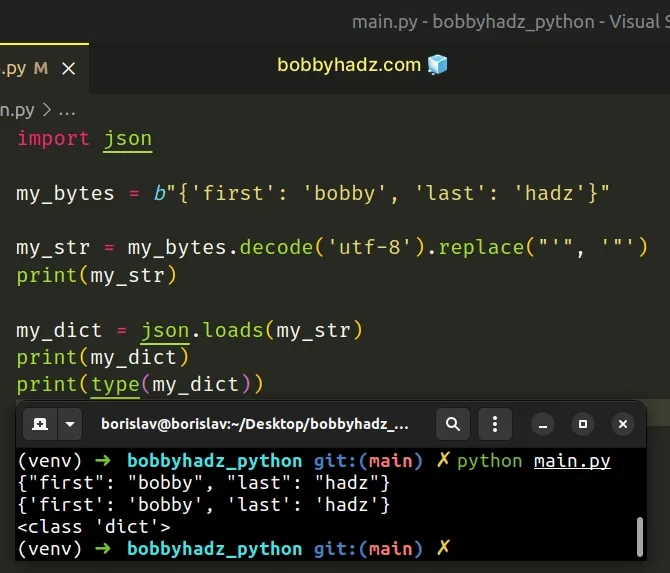
We used the str.replace() method to replace all single quotes in the string
with double quotes.
However, this could go wrong if some of the values also contain single quotes.
The ast.literal_eval() method safely evaluates the string, so it should be
your preferred approach.
# Converting a Dictionary to Bytes
If you need to convert a dictionary to bytes:
- Use the
json.dumps()method to convert the dictionary to a JSON string. - Use the
str.encode()method to convert the string to bytes.
import json my_dict = { 'first': 'bobby', 'last': 'hadz', 'age': 30, } my_str = json.dumps(my_dict) print(my_str) # 👉️ '{"first": "bobby", "last": "hadz", "age": 30}' my_bytes = my_str.encode('utf-8') print(my_bytes) # 👉️ b'{"first": "bobby", "last": "hadz", "age": 30}'
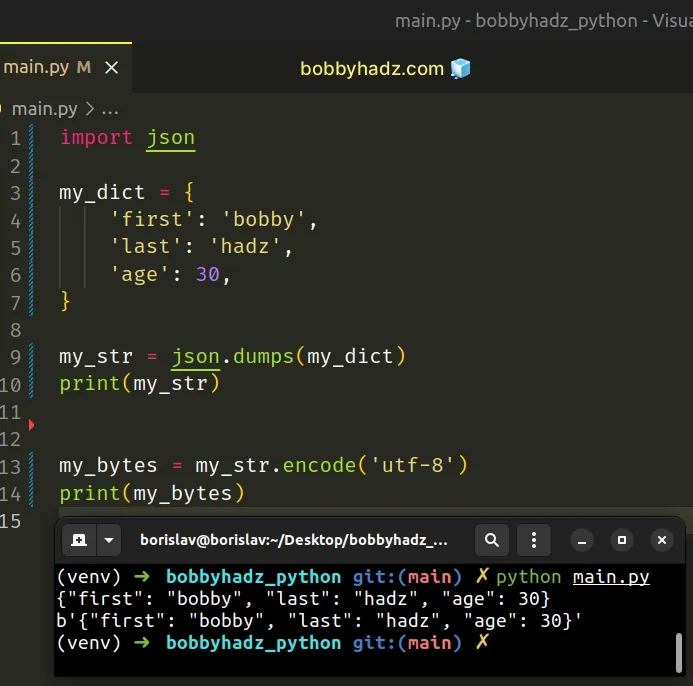
The json.dumps() method converts a Python object to a JSON formatted string.
Once we have a string, we can use the str.encode() method to convert it to
bytes.
The str.encode() method returns an
encoded version of the string as a bytes object. The default encoding is
utf-8.
# Additional Resources
You can learn more about the related topics by checking out the following tutorials:
- Get the length of a Bytes object in Python
- Generate random bytes of length N in Python
- AttributeError: 'bytes' object has no attribute 'encode'
- The JSON object must be str, bytes or bytearray, not dict
- Python socket.error: [Errno 104] Connection reset by peer
- IOPub data rate exceeded in Jupyter Notebook [Solved]
- Python binascii.Error: Incorrect padding
- How to decode URL and Form parameters in Python
- How to convert from HEX to ASCII in Python [5 Ways]

